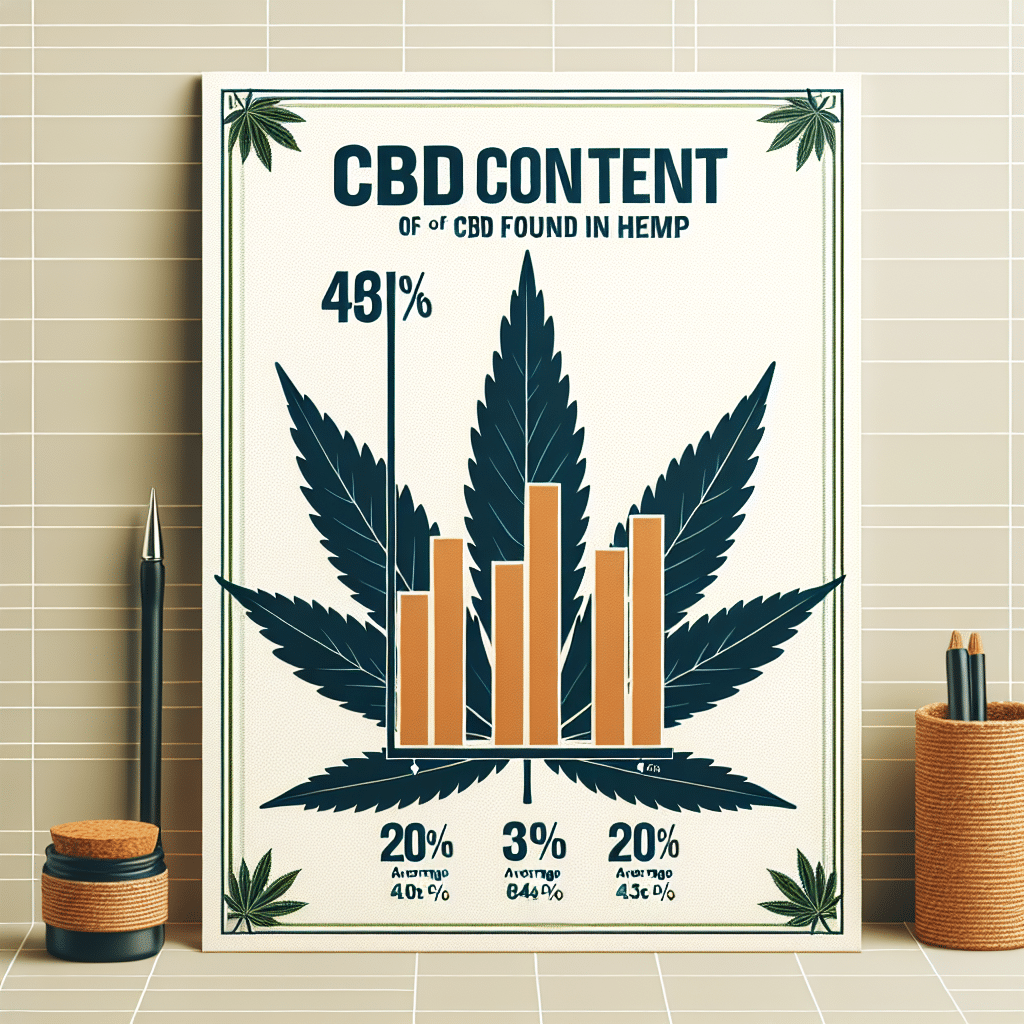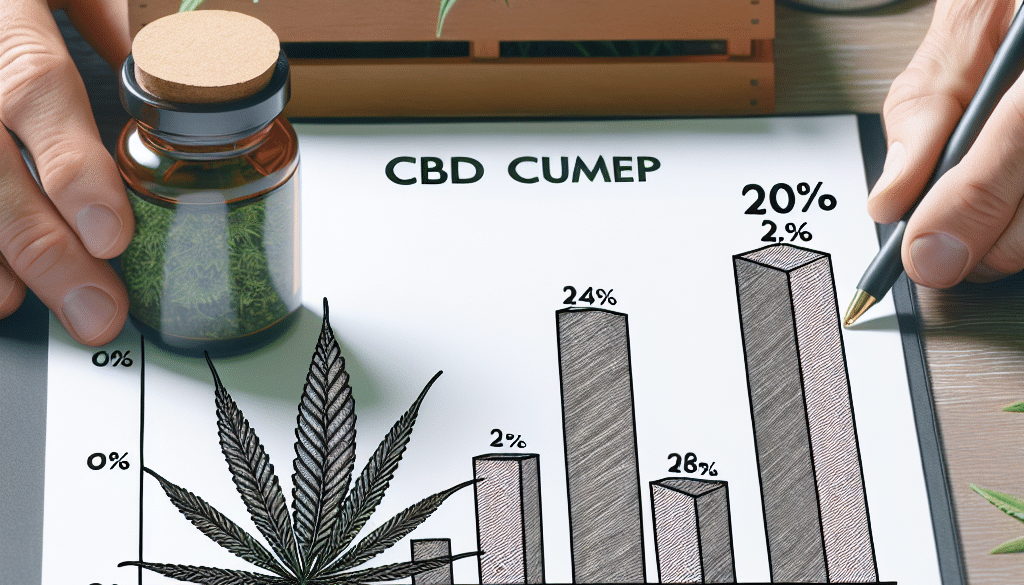What Percent CBD Is In Hemp?
-
Table of Contents
- CBD Content in Hemp: Understanding the Percentages
- What is CBD and Why is it Important?
- Understanding Hemp and Its CBD Content
- Factors Influencing CBD Percentage in Hemp
- Average CBD Levels in Hemp
- High-CBD Hemp Strains
- Regulations and Testing
- Understanding CBD Product Labels
- Case Studies and Research
- Conclusion: The Significance of CBD Percentages in Hemp
- Discover ETprotein’s Protein Products
CBD Content in Hemp: Understanding the Percentages

The world of cannabis and hemp is rich with various compounds, among which cannabidiol (CBD) has gained significant attention for its potential health benefits. Hemp, a variety of the Cannabis sativa plant species, is known for its high CBD content and minimal THC levels, making it the primary source for CBD products. In this article, we delve into the specifics of CBD percentages in hemp and what factors influence these levels.
What is CBD and Why is it Important?
Cannabidiol (CBD) is one of over a hundred cannabinoids found in cannabis plants. Unlike its psychoactive counterpart, THC (tetrahydrocannabinol), CBD does not produce a “high” and is sought after for its therapeutic properties. It has been studied for its potential role in easing symptoms of various conditions, including anxiety, epilepsy, inflammation, and chronic pain.
Understanding Hemp and Its CBD Content
Hemp is legally defined in many countries as a cannabis plant containing 0.3% or less THC by dry weight. This definition is crucial as it distinguishes hemp from marijuana, which has higher THC levels and is still federally illegal in many places. The CBD content in hemp can vary widely based on several factors, which we will explore.
Factors Influencing CBD Percentage in Hemp
The percentage of CBD in hemp is not a fixed number and can be influenced by various factors, including:
- Strain Genetics: Different hemp strains have been bred to produce varying levels of CBD. Some strains may have as low as 2-3% CBD, while others can reach upwards of 20%.
- Cultivation Practices: Factors such as soil quality, light exposure, and farming techniques can impact the cannabinoid production in hemp plants.
- Harvest Time: The timing of the harvest can affect the CBD potency. Hemp plants harvested at peak flowering can have higher CBD levels.
- Extraction Method: The process used to extract CBD from hemp also plays a role in the final CBD percentage of the product.
Average CBD Levels in Hemp
On average, most industrial hemp strains contain between 3-5% CBD. However, specialized high-CBD strains can reach much higher levels. It’s important to note that these percentages refer to the raw hemp plant material and not the final CBD product, which may have different concentrations based on the extraction and formulation processes.
High-CBD Hemp Strains
Some hemp strains are specifically cultivated to maximize CBD content. These strains can have CBD levels that range from 10% to 20% or more. Examples of high-CBD hemp strains include Charlotte’s Web, ACDC, and Harlequin. These strains are often used to produce CBD oils, tinctures, and other products that require a high concentration of CBD.
Regulations and Testing
Due to the legal status of hemp and CBD, there are strict regulations in place to ensure that hemp products do not exceed the THC threshold of 0.3%. Reputable manufacturers and growers regularly test their hemp plants and products to verify CBD and THC levels, ensuring compliance with laws and providing transparency to consumers.
Understanding CBD Product Labels
When purchasing CBD products derived from hemp, it’s essential to understand the labeling. Products may list the CBD content in milligrams for the entire package or per serving. Full-spectrum products contain all cannabinoids found in the hemp plant, including trace amounts of THC, while broad-spectrum products have non-detectable THC levels. CBD isolate products contain only CBD, with no other cannabinoids.
Case Studies and Research
Several studies have highlighted the variability of CBD content in hemp. For instance, research published in the Journal of Agricultural and Food Chemistry found significant differences in cannabinoid content among various hemp cultivars. Another study in the journal Planta Medica emphasized the importance of genetic selection and breeding for high-CBD hemp strains.
Conclusion: The Significance of CBD Percentages in Hemp
Understanding the percentage of CBD in hemp is crucial for consumers, manufacturers, and regulators alike. While the average CBD content in industrial hemp is typically between 3-5%, specialized strains and cultivation methods can significantly increase these levels. Consumers should pay close attention to product labels and lab reports to ensure they are getting the desired amount of CBD.
Discover ETprotein’s Protein Products
If you’re interested in high-quality protein products, consider exploring ETprotein’s offerings. Their range of organic bulk vegan proteins, including rice, pea, and seed-based proteins, are non-GMO and allergen-free. ETprotein also provides L-(+)-Ergothioneine (EGT) in various grades suitable for different industries. Whether you’re looking for ingredients for nutraceuticals, sports nutrition, or health and wellness products, ETprotein has solutions to meet your protein needs.
About ETprotein:
ETprotein, a reputable protein and L-(+)-Ergothioneine (EGT) Chinese factory manufacturer and supplier, is renowned for producing, stocking, exporting, and delivering the highest quality organic bulk vegan proteins and L-(+)-Ergothioneine. They include Organic rice protein, clear rice protein, pea protein, clear pea protein, watermelon seed protein, pumpkin seed protein, sunflower seed protein, mung bean protein, peanut protein, and L-(+)-Ergothioneine EGT Pharmaceutical grade, L-(+)-Ergothioneine EGT food grade, L-(+)-Ergothioneine EGT cosmetic grade, L-(+)-Ergothioneine EGT reference grade and L-(+)-Ergothioneine EGT standard. Their offerings, characterized by a neutral taste, non-GMO, allergen-free attributes, with L-(+)-Ergothioneine purity over 98%, 99%, cater to a diverse range of industries. They serve nutraceutical, pharmaceutical, cosmeceutical, veterinary, as well as food and beverage finished product distributors, traders, and manufacturers across Europe, USA, Canada, Australia, Thailand, Japan, Korea, Brazil, and Chile, among others.
ETprotein specialization includes exporting and delivering tailor-made protein powder and finished nutritional supplements. Their extensive product range covers sectors like Food and Beverage, Sports Nutrition, Weight Management, Dietary Supplements, Health and Wellness Products, and Infant Formula, ensuring comprehensive solutions to meet all your protein needs.
As a trusted company by leading global food and beverage brands and Fortune 500 companies, ETprotein reinforces China’s reputation in the global arena. For more information or to sample their products, please contact them and email sales(at)ETprotein.com today.












